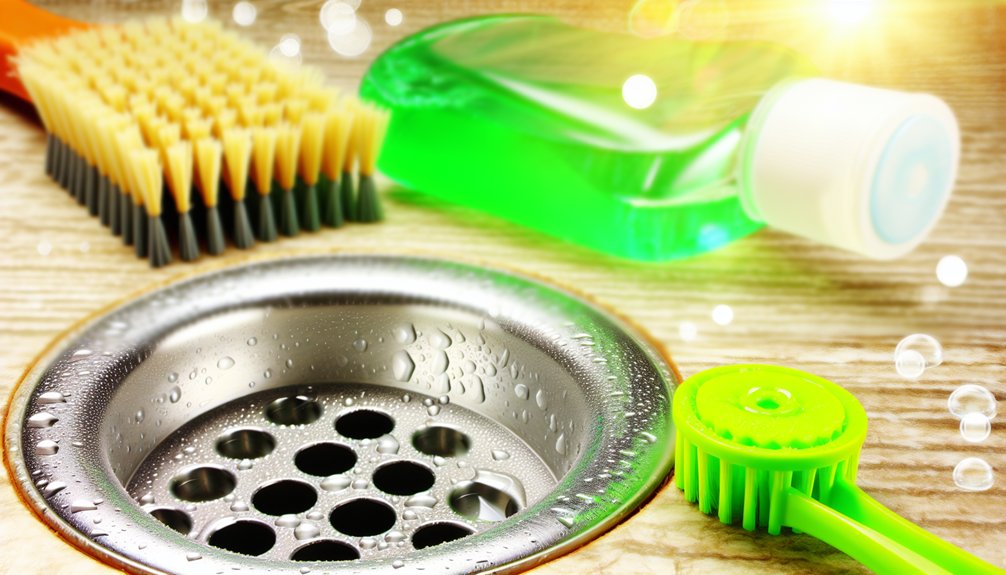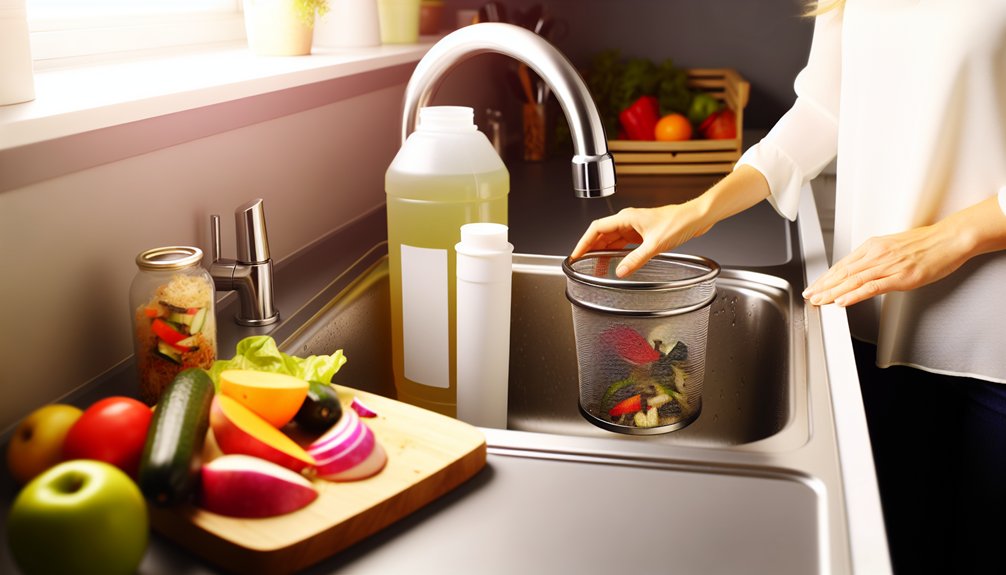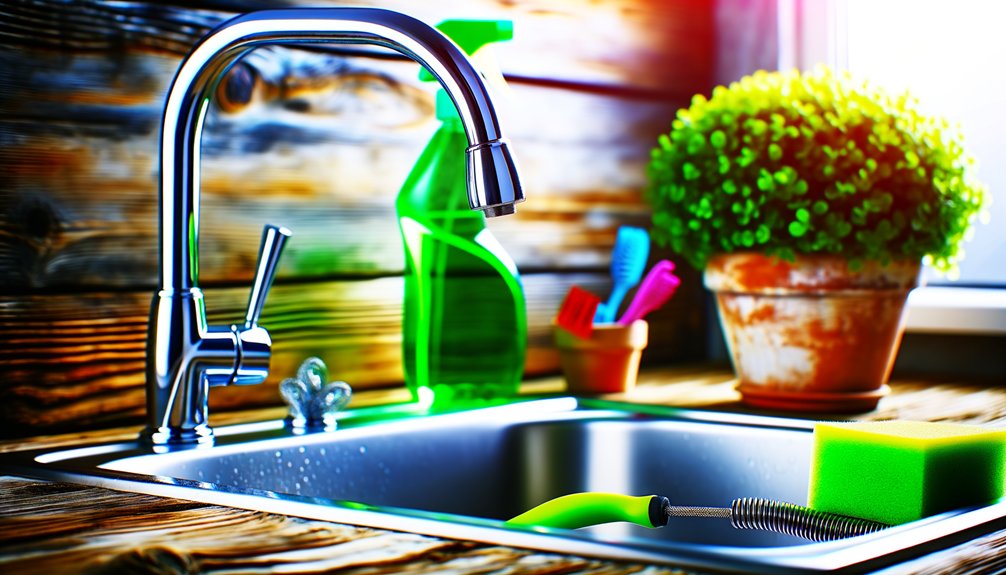Effective drain maintenance requires simple techniques and tools that are budget-friendly. Monthly cleaning with baking soda and vinegar can help dissolve buildup. Using drain strainers and screens captures food particles and hair, preventing clogs. Additionally, avoid flushing inappropriate items and pouring grease down drains. Regularly employing enzyme cleaners promotes a healthier plumbing system. Implementing these practices enhances efficiency and prolongs the lifespan of plumbing. Exploring further will uncover additional valuable insights for effective drain care.
Simple Cleaning Techniques for Drains

A consistent cleaning regimen can greatly enhance drain performance and longevity. Implementing monthly cleaning routines featuring a mixture of baking soda and vinegar can effectively dissolve buildup and debris within the drain. After allowing the solution to sit for 15 minutes, rinsing with hot water guarantees thorough removal of any remaining residue. Employing drain strainers or screens is vital for capturing food particles and hair, markedly reducing the occurrence of clogged drains. Additionally, pouring boiling water down drains weekly helps eliminate grease and soap scum, promoting the best possible drainage. Regular maintenance should also include the use of enzyme-based cleaners, which safely break down organic materials without damaging pipes. Finally, periodic cleaning of pop-up stoppers in sink drain assemblies is fundamental to prevent debris accumulation, which can lead to slow drainage and further blockages. These techniques collectively contribute to proper drain care and improved plumbing efficiency.
Essential Tools for Effective Drain Maintenance
Proper drain maintenance not only relies on effective cleaning techniques but also on the right tools to manage various plumbing issues. The selection of essential tools can greatly enhance drain care and minimize the occurrence of clogs.
- Drain Strainers: These inexpensive tools effectively catch food debris and hair, preventing blockages and reducing the need for frequent cleaning.
- Plumbing Auger: For tougher clogs located deep within pipes, a plumbing auger provides a powerful solution, ensuring thorough maintenance and preventing backups.
- Enzyme Cleaners: Regular application of enzyme cleaners breaks down organic materials, promoting healthier drains and a more efficient plumbing system.
Incorporating these tools into routine maintenance can liberate homeowners from the burdens of frequent plumbing issues, allowing them to maintain cleaner, more efficient drains with minimal effort.
Tips for Proper Waste Disposal to Prevent Clogs

How can proper waste disposal greatly reduce the risk of clogs in plumbing systems? Effective waste management is vital for maintaining clear drains and preventing costly plumbing issues. To prevent blockages, individuals should avoid flushing items such as wipes and feminine hygiene products, which can create significant potential problems in the plumbing system. Grease, fats, and oils must not be poured down drains, as they can solidify and obstruct water flow. Food scraps, coffee grounds, and fibrous materials like vegetable peels should also be disposed of properly, as they can clump together and lead to severe clogs. Educating household members about these practices is important, as improper disposal accounts for a substantial percentage of sewer backups. Utilizing trash bins for non-disposable items guarantees only appropriate waste enters plumbing systems, thereby contributing to effective drain maintenance and reducing the need for plumbing services.
Frequently Asked Questions
How Much Does Drain Maintenance Cost?
The cost of drain maintenance varies considerably based on factors such as location, service frequency, and common issues. Professional drain cleaning services typically range from $100 to $300, while routine inspections can cost between $75 and $150. Budget-conscious individuals may opt for DIY maintenance techniques, utilizing inexpensive ingredients or preventive measures like strainers, which cost under $20. Enzyme-based cleaners offer a safe, cost-effective option for seasonal care, generally priced between $10 and $20.
What Is the Best Thing to Keep Drains Clear?
To keep drains clear, diligent drain cleaning is essential. Employing natural solutions like a baking soda and vinegar mixture monthly effectively combats grease buildup. Utilizing drain covers and hair traps prevents debris from entering plumbing systems, while regular inspections help identify potential issues early. Additionally, understanding plumbing tools can facilitate timely maintenance. For emergency tips, always have a plunger on hand, ensuring swift responses to unexpected clogs and preserving the integrity of the drainage system.
Is Professional Drain Cleaning Worth It?
The question of whether professional drain cleaning is worth it often revolves around cost benefits and long-term savings. While DIY methods may address minor clogs, they typically lack the effectiveness of specialized equipment types used by professionals. Customer experiences highlight the importance of addressing safety concerns and potential plumbing issues early. Frequency recommendations suggest annual professional services to maintain ideal drain function, making this investment a prudent choice for homeowners seeking reliable and lasting solutions.
Why Do Plumbers Say to Not Use Drano?
"An ounce of prevention is worth a pound of cure." Plumbers advise against using Drano due to its potential to damage pipes and exacerbate common drain problems. Chemical drain cleaners can create heat that warps PVC, while ineffective against grease or roots. Such reliance fosters plumbing myths, neglecting eco-friendly alternatives and effective drain inspection techniques. Instead, embracing DIY drain solutions and adhering to plumbing safety practices promotes long-term drain clog prevention and maintenance.


